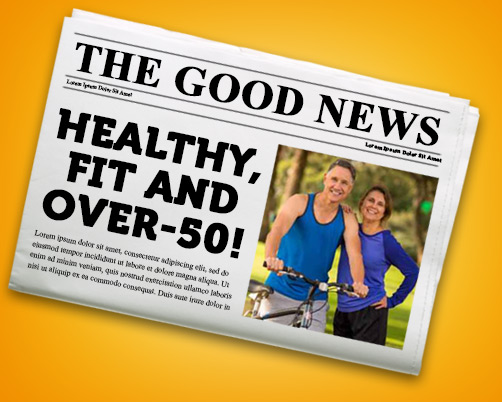
When it comes to health and good cheer the glass can be half full too when it comes to health ageing
Given this is the season of good cheer and no one needs any more lectures about what we are doing wrong, how about some new research on what some are doing right?
There are few more important, or irritating, guidelines about how much, or little, we should eat and drink and exercise to enjoy more healthy ageing.

Often the news reports focus on who is doing what and with good reason because the consequences of an over indulgence in bacon, sausages or an under indulgence in activity can be dire.
But this week’s National Health Survey from the Australian Bureau of Statistics* can, despite some of the headlines, be seen as a glass half full as opposed to half empty.
For example more than half, some 56%, of adult Australians consider themselves in excellent or very good health and only 15% rated it as fair or poor.
Maybe we are unrealistic optimists. An assessment of the major long-term health conditions suffered, presumably more by older Australians, is also illuminating.
The most prevalent conditions were mental and behavioural and effected 4 million people (17.5%) while the least common of the listed complaints was the one which perhaps elicits most fear cancer at 370,000 (1.6%)
In between was the litany of complaints such as arthritis 3.5 million (15.3%) and hypertension 2.6 million (5.2%). Two of the conditions which now attract most attention were heart disease and diabetes which both affected 1.2 million (5%).
In terms of exercise 55.5% of 18-64 year old did enough physical activity in the week, (150 minutes of moderate movement) before they were questioned and 15% described themselves as inactive.
In the 55-64 age group just over 50% of men and just under 50% of women met or exceeded those 150 minutes of exercise such as walking for fitness, sport and recreation
It surprised me alcohol-wise only 17.4% of adults drank more than the recommended two standard drinks per day on average, although men put away more than women.
Again 50% of adults met the dietary guidelines on how much fruit they munch a day but less than 7% make it in terms of vegetables.
Health maybe something the young take for granted but as you get on it becomes a more central and costly concern. Healthy ageing is a term you’ll hear a lot more about.
It refers according to The World Health Organization as 'the process of developing and maintaining the functional ability that enables well-being in older age'
It’s something we could all use more of and governments, which need to reduce the burden of the growing number of older Australians on various budgets including health, need to do more to promote
As it’s Christmas let’s be charitable on ourselves for a change and before the scourge of fruitless New Year Resolutions kick let’s appreciate what is good about our health.


